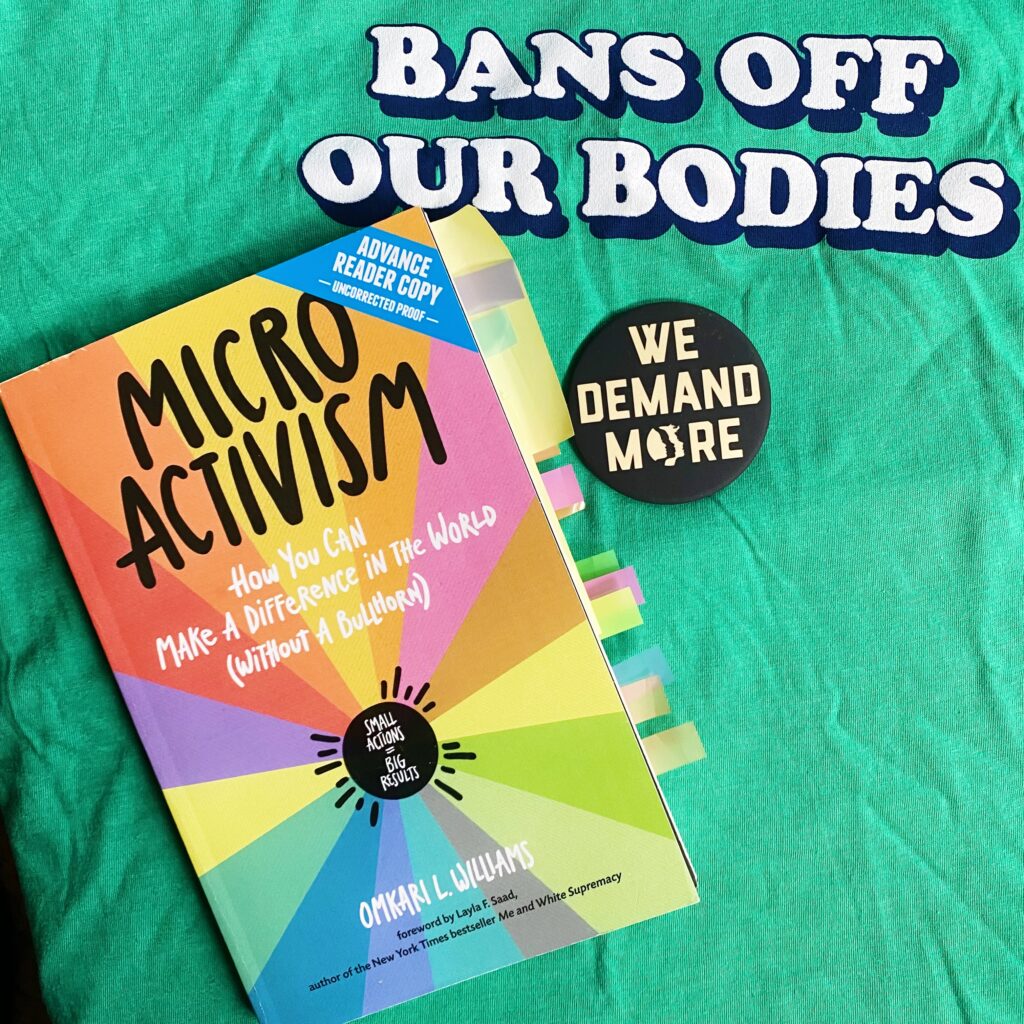This post was sponsored by Storey Press. All opinions are my own. Our sponsors help us to pay our staff and to keep feminist media independent!
My schedule has gotten exceptionally full lately and I know I’m not alone in this. Once summer is over, it feels like we’re all in a sprint towards the holiday season. At the same time, November always means election time and it can be so hard to find the reserves of energy within me to participate in activism.
Imagine my delight when Storey Publishing offered me an advanced copy of Micro Activism: How You Can Make a Difference in the World (Without a Bullhorn) by Omkari L. Williams. This book lays out a realistic step-by-step plan to incorporate activist activities into your everyday life. The keyword in that sentence is realistic. We all know burnout is real and many of us can hardly keep our heads above water as it is, but Williams’ approach is all about working smarter, not harder.
The first thing that struck me about this book is the introduction by Layla F. Saad. I’ve been following Saad’s work for almost a decade now and am so inspired by the thoughtful, intentional, and inclusive way she does her activism. In her introduction to Micro Activism, she sets the stage for who can claim the title “activist” and, more importantly, how we can all claim it. It’s not only the big bombastic leaders who are activists, it’s the quiet support team. In fact, in the very next chapter, Williams sets out her four activist archetypes: the Indispensable, the Producer, the Organizer, and the Headliner.
Like any good categorizing system, these archetypes aren’t meant to be static. The borders are vague but we all tend to drift to one or two over the others. For instance, I can feel myself moving out of my Headliner era (leading a movement, being the face of an organization, having my voice heard by many) to my Producer era (maintaining the big picture and making sure everyone hits their mark). All four archetypes are essential to any movement.
Once we understand our preferred approach to activism, Williams walks us through how we harness our limited energy. She urges the reader to pick one cause, two at the very most, and simply focus. The theme throughout this book is that consistency is key. Small, incremental actions from a lot of people will build upon each other to create monumental change. The crux of good activism is finding your community. If you’re concerned about that component, don’t worry! There’s an entire chapter dedicated to simply actionable strategies to find your community no matter where you are. One of my favorite tips in this chapter is “Form Multigenerational Groups.” More and more, I realize that leaning on the wisdom of those activists who have been doing this work for longer than I have means I don’t have to reinvent the wheel all the time. On the other hand, the wisdom of the activists younger than me lies in their energy and their fingers on the pulse of that energy. I am constantly inspired by all generations for all different reasons. What happens when we harness that power towards a single goal? Magic.
In reading Micro Activism, I was often reminded of my favorite Martin Luther King, Jr. quotes, a snippet of a 1968 sermon at the National Cathedral: “We shall overcome because the arc of the moral universe is long, but it bends toward justice.” This quote and this book both remind us that the real work is our legacy.
Fittingly, Williams ends the book directly discussing legacy. How do we want to leave this world? As a child-free woman, I appreciate that Williams expands the idea of legacy beyond familial ties. In fact, legacy is the conflux of past, present, and future, all in conversation with one another at the same time. How can we be good ancestors now while paving the way for the next generation? One bite-sized moment of activism at a time. And Micro Activism by Omkari Williams will help you get there.


